新概念英语第一册所有语法点汇总
新概念英语第一册语法知识点

新概念英语第一册语法总结时态:一般现在时、现在进行时、一般过去时、现在完成时、一般将来时、过去进行时、过去完成时、过去将来时1. 一般现在时★含有be动词的句子He is a teacher.The girl is very beautiful.Tim and Jack are students.★变疑问句将be动词移到句首Is he a teacher?Is the girl very beautiful?Are Tim and Jack students?★变否定句在be动词后面加notHe is not a teacher.The girl is not very beautiful.Tim and Jack are not students.★肯定回答及否定回答Yes, he is. No, he is not.Yes, she is. No, she is not.Yes, they are. No, they are not.★含有一般动词的句子★第三人称单数及单数名词He likes books.She likes him.The dog likes bones.★变疑问句在句首加does, 动词变为原型Does he like books?Does she like him?Does the dog like bones?★变否定句在主语及动词之间加doesn’t, 动词变为原型He doesn’t like books.She doesn’t like him.The dog doesn’t like bones.★肯定回答及否定回答:Yes, he does. No, he doesn’t.Yes, she does. No, she doesn’tYes, it does. No, it doesn’t.注意:第三人称单数形式一般在动词后面加S。
★其他人称及复数名词I want to have a bath.We have some meat.The students like smart teachers.★变疑问句在句首加doDo you want to have a bath?Do we have any meat?Do the students like smart teachers?★变否定句在主语和动词之间加don’t.You don’t want to have a bath.We don’t have any meat.The students don’t like smart teachers.★肯定回答及否定回答Yes, I do. No, I don’t.Yes, we do. No, we don’tYes, they do. No, they don’t.构成:主语+be动词+动词的现在分词+其它成分We are having lunch.He is reading a book.The dog is running after a cat.The boys are swimming across the river.★变疑问句将be动词移到句首Are we having lunch?Is he reading a book?Is the dog running after a cat?Are the boys swimming across the river?★变否定句在be动词后面加notWe are not having lunch.He is not reading a book.The dog is not running after a cat.The boys are swimming across the river.★特殊疑问句:what, which, how, where, who, etc.疑问词+be动词+主语+现在分词What are you doing?What is she doing?What is the dog doing没有进行时的动词(必背)表示状态、思想、感情、感觉的动词不能表示正在进行的动作1. 表示感觉、感官的词see, hear, like, love, want2. have, has作为动词”拥有”的含义时,没有进行时常和表示过去的时间状语连用,如yesterday, last night, the day before yesterday, three days ago.含有be动词的句子,将动词变为过去式,am / is的变为was,are的变为wereI was at the butcher’s.You were a student a year ago.The teacher was very beautiful ten years ago.★变疑问句将be动词移动到句首Were you at the butcher’sWere you a student a year agoWas the teacher very beautiful ten years ago★变否定句在be动词后面加notI was not at the butcher’s.You were not a student a year ago.The teacher was not very beautiful ten years ago.★肯定回答否定回答Yes, I was. No, I was not.Yes, you were. No, you were not.Yes, he/she was. No, he/she was not.★特殊疑问句:What did you do?不含有be动词的句子,将动词变为过去式,动词过去式构成见附录I finished my homework yesterday.The boy went to a restaurant.The Sawyers lived at King Streeta year ago.King Streeta year ago.★变疑问句在句首加did,动词变为原型Did you finish your homework yesterday?Did the boy go to a restaurant?Did the Sawyers live at King Streeta year ago?King Streeta year ago★变否定句在主语和动词之间加did not,动词变为原型I did not finish my homework yesterday.The boy did not go to a restaurant.The Sawyers did not live at King Streeta year ago.King Streeta year ago.★肯定回答及否定回答Yes, I did. No, I didn’t.Yes, he did. No, he didn’t.Yes, they did. No, they did not.have/has+过去分词用法:1)表示过去发生且和现在有某种联系的动作,常和just, usually, already, since等时间副词连用I have just had lunch. (饱了,不用再吃了)He has had a cup of tea.(不渴了,不用再喝)They have already had their holiday. (不能再度假了)The boy has already read the book. (已经知道书的内容了,不用再看了)2)询问别人是否做过某事一般用现在完成时Have you finished your homework?Have you been to Beijing?Have he seen the film?3)表示开始于过去并持续到现在的动作I have lived in Beijing for twenty years.I have worked for this school for 1 year.4)表示一种经历、经验:去过…地方,做过…事情,经历过…事情I have never had a bath.I have never seen a film.I have never been to cinema.I have ever been to Paris.Have been to表示去过,have gone to 表示去了I have been to London.(人已经回来)He has gone to London.(人还在那里)5)表示一种结果,一般不和时间副词联用I have lost my pen.I have hurt myself.He has become a teacher.She has broken my heart.句型变化:★变疑问句将助动词移到句首,变否定句在助动词后面加not.Have you lost your pen I have not lost my pen.★肯定回答及否定回答Yes, I have. No, I have not.★特殊疑问句:What have you done?What has he done一般过去时与现在完成时的区别:凡是有明确的表示过去的时间状语的句子为过去时注意:有些动词表示的动作有一个终点,不能再延续,因此不能和表示一段时间状语连用错:I’ve left Beijing for 3 days.对:I left Beijing 3 days ago. I have been away from being for 3 days.经常和tomorrow, next year, the day after tomorrow, the year after the next, in five hours’ time, etc. 表示将来的词联用结构:主语+助动词will+动词原形I will go to America tomorrow.The pilot will fly to Japan the month after the next.Jack will move into his new house tomorrow morning.★变疑问句将助动词移到句首Will you go to America tomorrow?Will the pilot fly to Japan the month after the next?Will Jack move into his new house tomorrow morning?★变否定句在助动词后面加notI will not go to America tomorrow.The pilot will not fly to Japan the month after the next.Jack will not move into his new house tomorrow morning★肯定回答及否定回答Yes, I will. No, I will not.Yes, he/she will. No, he/she will not.Yes, he will. No, he will not.★特殊疑问句:What will you do结构:had+过去分词After she had finished her homework, she went shopping.They had sold the car before I asked the price.The train had left before I arrived at the station.After/before引导的时间状语从句放在句首要在句子后面加逗号,如果放在主句后则不用。
新概念英语第一册语法知识点
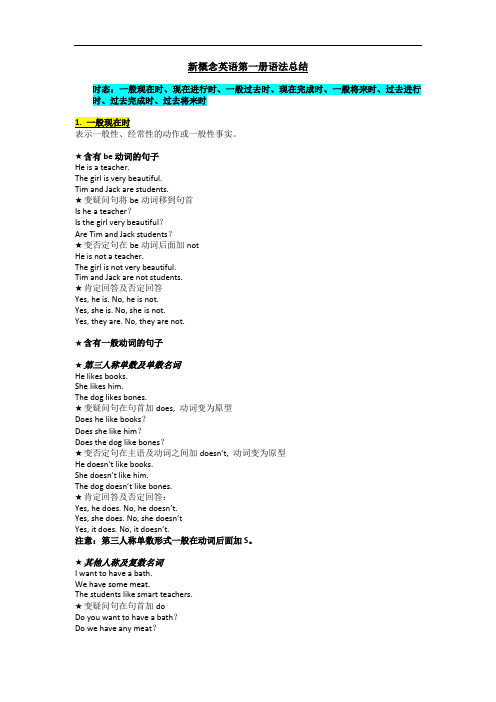
新概念英语第一册语法总结时态:一般现在时、现在进行时、一般过去时、现在完成时、一般将来时、过去进行时、过去完成时、过去将来时1. 一般现在时★含有be动词的句子He is a teacher.The girl is very beautiful.Tim and Jack are students.★变疑问句将be动词移到句首Is he a teacher?Is the girl very beautiful?Are Tim and Jack students?★变否定句在be动词后面加notHe is not a teacher.The girl is not very beautiful.Tim and Jack are not students.★肯定回答及否定回答Yes, he is. No, he is not.Yes, she is. No, she is not.Yes, they are. No, they are not.★含有一般动词的句子★第三人称单数及单数名词He likes books.She likes him.The dog likes bones.★变疑问句在句首加does, 动词变为原型Does he like books?Does she like him?Does the dog like bones?★变否定句在主语及动词之间加doesn’t, 动词变为原型He doesn’t like books.She doesn’t like him.The dog doesn’t like bones.★肯定回答及否定回答:Yes, h e does. No, he doesn’t.Yes, she does. No, she doesn’tYes, it does. No, it doesn’t.注意:第三人称单数形式一般在动词后面加S。
★其他人称及复数名词I want to have a bath.We have some meat.The students like smart teachers.★变疑问句在句首加doDo you want to have a bath?Do we have any meat?Do the students like smart teachers?★变否定句在主语和动词之间加don’t.You don’t want to have a bath.We don’t have any meat.The students don’t like smart teachers.★肯定回答及否定回答Yes, I do. No, I don’t.Yes, we do. No, we don’tYes, they do. No, they don’t.构成:主语+be动词+动词的现在分词+其它成分We are having lunch.He is reading a book.The dog is running after a cat.The boys are swimming across the river.★变疑问句将be动词移到句首Are we having lunch?Is he reading a book?Is the dog running after a cat?Are the boys swimming across the river?★变否定句在be动词后面加notWe are not having lunch.He is not reading a book.The dog is not running after a cat.The boys are swimming across the river.★特殊疑问句:what, which, how, where, who, etc.疑问词+be动词+主语+现在分词What are you doing?What is she doing?What is the dog doing没有进行时的动词(必背)表示状态、思想、感情、感觉的动词不能表示正在进行的动作1. 表示感觉、感官的词see, hear, like, love, want2. have, has作为动词”拥有”的含义时,没有进行时常和表示过去的时间状语连用,如yesterday, last night, the day before yesterday, three days ago.含有be动词的句子,将动词变为过去式,am / is的变为was,are的变为wereI was at the butcher’s.You were a student a year ago.The teacher was very beautiful ten years ago.★变疑问句将be动词移动到句首Were you at the butcher’sWere you a student a year agoWas the teacher very beautiful ten years ago★变否定句在be动词后面加notI was not at the butcher’s.You were not a student a year ago.The teacher was not very beautiful ten years ago.★肯定回答否定回答Yes, I was. No, I was not.Yes, you were. No, you were not.Yes, he/she was. No, he/she was not.★特殊疑问句:What did you do?不含有be动词的句子,将动词变为过去式,动词过去式构成见附录I finished my homework yesterday.The boy went to a restaurant.The Sawyers lived at King Streeta year ago.King Streeta year ago.★变疑问句在句首加did,动词变为原型Did you finish your homework yesterday?Did the boy go to a restaurant?Did the Sawyers live at King Streeta year ago?King Streeta year ago★变否定句在主语和动词之间加did not,动词变为原型I did not finish my homework yesterday.The boy did not go to a restaurant.The Sawyers did not live at King Streeta year ago.King Streeta year ago.★肯定回答及否定回答Yes, I did. No, I didn’t.Yes, he did. No, he didn’t.Yes, they did. No, they did not.*have/has+过去分词用法:1)表示过去发生且和现在有某种联系的动作,常和just, usually, already, since等时间副词连用I have just had lunch. (饱了,不用再吃了)He has had a cup of tea.(不渴了,不用再喝)They have already had their holiday. (不能再度假了)The boy has already read the book. (已经知道书的内容了,不用再看了)2)询问别人是否做过某事一般用现在完成时Have you finished your homework?Have you been to Beijing?Have he seen the film?3)表示开始于过去并持续到现在的动作I have lived in Beijing for twenty years.I have worked for this school for 1 year.4)表示一种经历、经验:去过…地方,做过…事情,经历过…事情I have never had a bath.I have never seen a film.I have never been to cinema.I have ever been to Paris.Have been to表示去过,have gone to 表示去了I have been to London.(人已经回来)He has gone to London.(人还在那里)5)表示一种结果,一般不和时间副词联用I have lost my pen.I have hurt myself.He has become a teacher.She has broken my heart.句型变化:★变疑问句将助动词移到句首,变否定句在助动词后面加not.Have you lost your pen I have not lost my pen.★肯定回答及否定回答Yes, I have. No, I have not.★特殊疑问句:What have you done?What has he done一般过去时与现在完成时的区别:凡是有明确的表示过去的时间状语的句子为过去时注意:有些动词表示的动作有一个终点,不能再延续,因此不能和表示一段时间状语连用错:I’ve left Beijing for 3 days.对:I left Beijing 3 days ago. I have been away from being for 3 days.经常和tomorrow, next year, the day after tomorrow, the year after the next, in five hours’ time, etc. 表示将来的词联用结构:主语+助动词will+动词原形I will go to America tomorrow.The pilot will fly to Japan the month after the next.Jack will move into his new house tomorrow morning.★变疑问句将助动词移到句首Will you go to America tomorrow?Will the pilot fly to Japan the month after the next?Will Jack move into his new house tomorrow morning?★变否定句在助动词后面加notI will not go to America tomorrow.The pilot will not fly to Japan the month after the next.Jack will not move into his new house tomorrow morning★肯定回答及否定回答Yes, I will. No, I will not.Yes, he/she will. No, he/she will not.Yes, he will. No, he will not.★特殊疑问句:What will you do结构:had+过去分词After she had finished her homework, she went shopping.They had sold the car before I asked the price.The train had left before I arrived at the station.After/before引导的时间状语从句放在句首要在句子后面加逗号,如果放在主句后则不用。
新概念英语第一册语法知识点
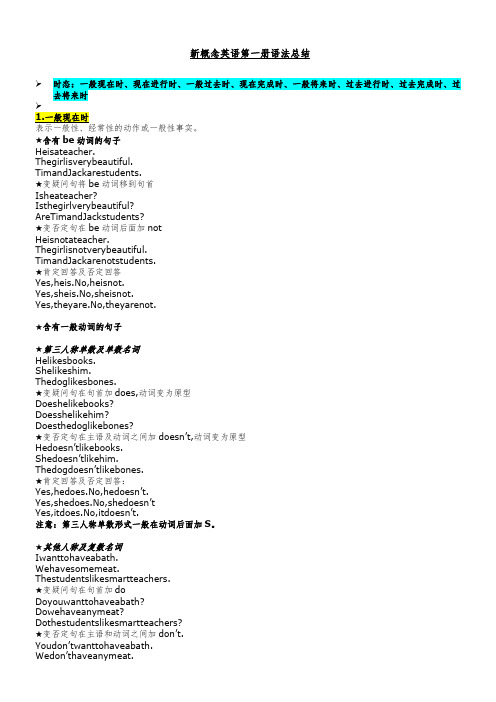
新概念英语第一册语法总结时态:一般现在时、现在进行时、一般过去时、现在完成时、一般将来时、过去进行时、过去完成时、过去将来时★含有be动词的句子Heisateacher.Thegirlisverybeautiful.TimandJackarestudents.★变疑问句将be动词移到句首★★★★★★★Yes,itdoes.No,itdoesn’t.注意:第三人称单数形式一般在动词后面加S。
★其他人称及复数名词Iwanttohaveabath.Wehavesomemeat.Thestudentslikesmartteachers.★变疑问句在句首加doDoyouwanttohaveabath?Dowehaveanymeat?Dothestudentslikesmartteachers?★变否定句在主语和动词之间加don’t.Youdon’twanttohaveabath.Wedon’thaveanymeat.Thestudentsdon’tlikesmartteachers.★肯定回答及否定回答Yes,Ido.No,Idon’t.Yes,wedo.No,wedon’tYes,theydo.No,theydon’t.构成:主语+be动词+动词的现在分词+其它成分Wearehavinglunch.Heisreadingabook.Thedogisrunningafteracat.Theboysareswimmingacrosstheriver.,如★变疑问句将be动词移动到句首Wereyouatthebutcher’s?Wereyouastudentayearago?Wastheteacherverybeautifultenyearsago?★变否定句在be动词后面加notIwasnotatthebutcher’s.Youwerenotastudentayearago.Theteacherwasnotverybeautifultenyearsago.★肯定回答否定回答Yes,Iwas.No,Iwasnot.Yes,youwere.No,youwerenot.Yes,he/shewas.No,he/shewasnot.★特殊疑问句:Whatdidyoudo?不含有be动词的句子,将动词变为过去式,动词过去式构成见附录Ifinishedmyhomeworkyesterday. Theboywenttoarestaurant. TheSawyerslivedatKingStreetayearago.KingStreetayearago.★变疑问句在句首加did,动词变为原型Didyoufinishyourhomeworkyesterday? Didtheboygotoarestaurant? DidtheSawyersliveatKingStreetayearago? KingStreetayearago?★变否定句在主语和动词之间加didnot,动词变为原型IhavebeentoLondon.(人已经回来) HehasgonetoLondon.(人还在那里)5)表示一种结果,一般不和时间副词联用Ihavelostmypen.Ihavehurtmyself.Hehasbecomeateacher.Shehasbrokenmyheart.句型变化:★变疑问句将助动词移到句首,变否定句在助动词后面加not. Haveyoulostyourpen?Ihavenotlostmypen.★肯定回答及否定回答Yes,Ihave.No,Ihavenot.★特殊疑问句:Whathaveyoudone?Whathashedone?一般过去时与现在完成时的区别:凡是有明确的表示过去的时间状语的句子为过去时注意:有些动词表示的动作有一个终点,不能再延续,因此不能和表示一段时间状语连用错:I’veleftBeijingfor3days.对:IleftBeijing3daysago.Ihavebeenawayfrombeingfor3days.将来将要发生的动作,经常和tomorrow,nextyear,thedayaftertomorrow,theyearafter thenext,infivehours’time,etc.表示将来的词★变否定句在助动词后面加notShehadn’tfinishedherhomework.★肯定回答及否定回答Yes,shehad.No,shehadn’t.★特殊疑问句:Whathadshedone?when,while,as引导的状语从句中。
新概念英语第一册语法汇总
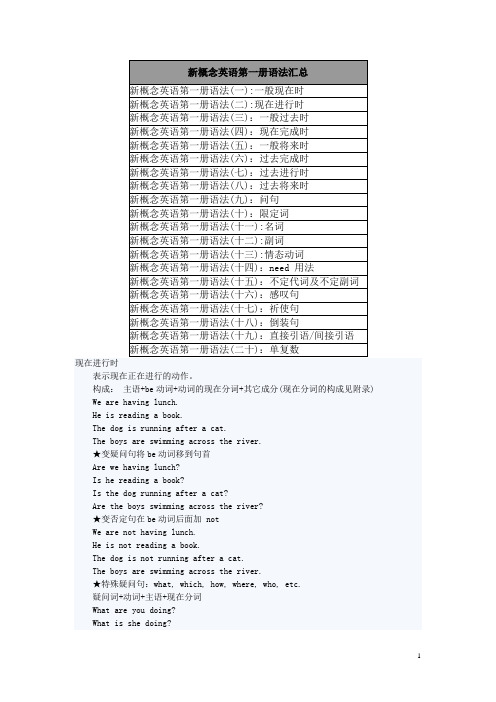
What is the dog doing?没有进行时的动词(必背)表示状态,思想,感情和感觉的动词不能表示正在进行的动作1. 表示感觉,感官的词see, hear, like, love, want,2. have, has当”拥有”讲时没有进行时一、时态:一般现在时,现在进行时,一般过去时,现在完成时,一般将来时,过去进行时,过去完成时,过去将来时1. 一般现在时表示一般性,经常性的动作或一般性事实。
1 含有be动词的句子He is a teacher.The girl is very beautiful.Tim and Jack are students.★变疑问句将be动词移到句首Is he a teacher?Is the girl very beautiful?Are Tim and Jack students?★变否定句在be动词后面加notHe is not a teacher.The girl is not very beautiful.Tim and Jack are not students.★肯定回答及否定回答Yes, he is. No, he is not.Yes, she is. No, she is not.Yes, they are. No, they are not.★不含有be动词的句子,即含有一般动词的句子第三人称单数及单数名词He likes books.She likes him.The dog likes bones.★变疑问句在句首加does, 动词变为原型Does he like books?Does she like him?Does the dog like bones?★变否定句在主语及动词之间加doesn’t, 动词变为原型,原句中的动词不再有第三人称变化。
He doesn’t like books.She doesn’t like him.The dog doesn’t like bones.★肯定回答及否定回答:Yes, he does. No, he doesn’t.Yes, she does. No, she doesn’tYes, it does. No, it doesn’t.注意:第三人称单数形式一般在动词后面加S,不要和名词复数混淆,变否定句或疑问句时名词复数没有任何变化。
新概念英语第一册全部语法
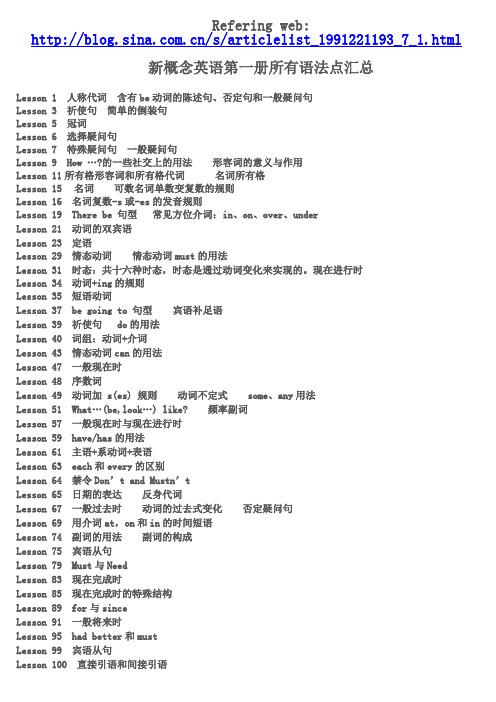
Refering web:/s/articlelist_1991221193_7_1.html新概念英语第一册所有语法点汇总Lesson 1 人称代词含有be动词的陈述句、否定句和一般疑问句Lesson 3 祈使句简单的倒装句Lesson 5 冠词Lesson 6 选择疑问句Lesson 7 特殊疑问句一般疑问句Lesson 9 How…?的一些社交上的用法形容词的意义与作用Lesson 11所有格形容词和所有格代词名词所有格Lesson 15 名词可数名词单数变复数的规则Lesson 16 名词复数-s或-es的发音规则Lesson 19 There be句型常见方位介词:in、on、over、underLesson 21 动词的双宾语Lesson 23 定语Lesson 29 情态动词情态动词must的用法Lesson 31 时态:共十六种时态,时态是通过动词变化来实现的。
现在进行时Lesson 34 动词+ing的规则Lesson 35 短语动词Lesson 37 be going to句型宾语补足语Lesson 39 祈使句 do的用法Lesson 40 词组:动词+介词Lesson 43 情态动词can的用法Lesson 47 一般现在时Lesson 48 序数词Lesson 49 动词加 s(es) 规则动词不定式some、any用法Lesson 51 What…(be,look…) like? 频率副词Lesson 57 一般现在时与现在进行时Lesson 59 have/has的用法Lesson 61 主语+系动词+表语Lesson 63 each和every的区别Lesson 64 禁令Don’t and Mustn’tLesson 65 日期的表达反身代词Lesson 67 一般过去时动词的过去式变化否定疑问句Lesson 69 用介词at,on和in的时间短语Lesson 74 副词的用法副词的构成Lesson 75 宾语从句Lesson 79 Must与NeedLesson 83 现在完成时Lesson 85 现在完成时的特殊结构Lesson 89 for与sinceLesson 91 一般将来时Lesson 95 had better和mustLesson 99 宾语从句Lesson 100 直接引语和间接引语Lesson 101 反意疑问句Lesson 103 too与enough的用法Lesson 105 动词不定式Lesson 107 形容词的比较级和最高级Lesson 111 形容词的平级比较级Lesson 113 so与neither引导的简短回答Lesson 116 不定代词Lesson 117 过去进行时概念和结构Lesson 119 过去完成时Lesson 121 定语从句Lesson 123 感叹句Lesson 125 must, have to和needn’tLesson 127 表示猜测和推断的情态助动词must和can’tLesson 131 情态助动词may表示可能性Lesson 133 需改变时态的间接陈述句Lesson 135 Let的用法Lesson 137 条件从句Lesson 141-144 被动语态新概念英语第一册全部语法一.时态:一般现在时,现在进行时,一般过去时,现在完成时,一般将来时,过去进行时,过去完成时,过去将来时1. 一般现在时表示一般性,经常性的动作或一般性事实。
新概念英语第一册各课语法知识汇总
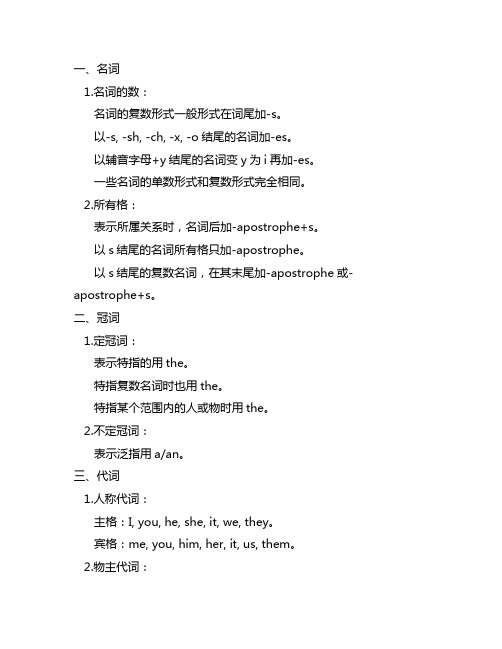
一、名词1.名词的数:名词的复数形式一般形式在词尾加-s。
以-s, -sh, -ch, -x, -o结尾的名词加-es。
以辅音字母+y结尾的名词变y为i再加-es。
一些名词的单数形式和复数形式完全相同。
2.所有格:表示所属关系时,名词后加-apostrophe+s。
以s结尾的名词所有格只加-apostrophe。
以s结尾的复数名词,在其末尾加-apostrophe或-apostrophe+s。
二、冠词1.定冠词:表示特指的用the。
特指复数名词时也用the。
特指某个范围内的人或物时用the。
2.不定冠词:表示泛指用a/an。
三、代词1.人称代词:主格:I, you, he, she, it, we, they。
宾格:me, you, him, her, it, us, them。
2.物主代词:形容词性物主代词:my, your, his, her, its, our, their。
名词性物主代词:mine, yours, his, hers, its, ours, theirs。
3.指示代词:this, that, these, those。
4.不定代词:some, any, no, every, each, many, much, few, little。
四、形容词1.形容词的用法:在名词前作定语。
在系动词之后作表语。
2.比较级和最高级:比较级:比较两者时,用比较级。
最高级:表示三者或三者以上之间的比较。
五、动词1.动词的三单形式:一般情况,动词第三人称单数在末尾加-s。
以辅音字母加y结尾的动词变y为i再加-es。
直接在词尾加-es的动词。
2.动词的现在进行时:am/is/are+动词的现在分词。
3.行为动词的过去式:动词过去式变化规则有规则动词和不规则动词。
六、副词1.副词的用法:修饰动词、形容词、副词。
表示时间、地点、原因、目的等。
2.比较级和最高级:副词比较级和最高级的构成。
七、介词1.介词的基本用法:表示方位、时间、原因、目的等。
新概念英语第一册语法重点难点点汇总
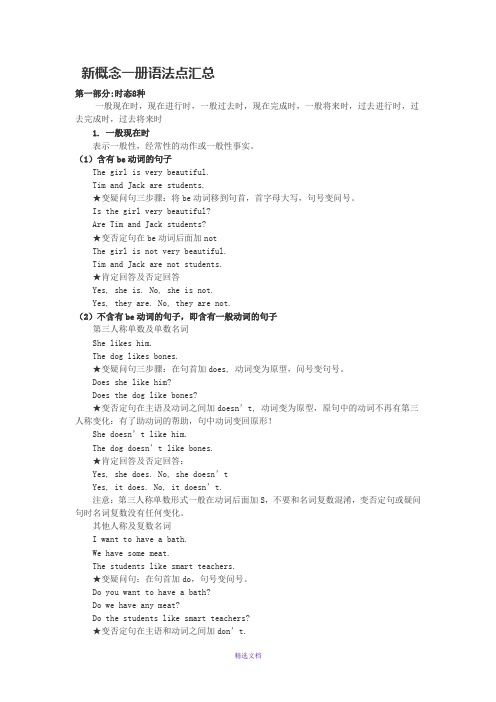
新概念一册语法点汇总第一部分:时态8种一般现在时,现在进行时,一般过去时,现在完成时,一般将来时,过去进行时,过去完成时,过去将来时1. 一般现在时表示一般性,经常性的动作或一般性事实。
(1)含有be动词的句子The girl is very beautiful.Tim and Jack are students.★变疑问句三步骤:将be动词移到句首,首字母大写,句号变问号。
Is the girl very beautiful?Are Tim and Jack students?★变否定句在be动词后面加notThe girl is not very beautiful.Tim and Jack are not students.★肯定回答及否定回答Yes, she is. No, she is not.Yes, they are. No, they are not.(2)不含有be动词的句子,即含有一般动词的句子第三人称单数及单数名词She likes him.The dog likes bones.★变疑问句三步骤:在句首加does, 动词变为原型,问号变句号。
Does she like him?Does the dog like bones?★变否定句在主语及动词之间加doesn’t, 动词变为原型,原句中的动词不再有第三人称变化:有了助动词的帮助,句中动词变回原形!She doesn’t like him.The dog doesn’t like bones.★肯定回答及否定回答:Yes, she does. No, she doesn’tYes, it does. No, it doesn’t.注意:第三人称单数形式一般在动词后面加S,不要和名词复数混淆,变否定句或疑问句时名词复数没有任何变化。
其他人称及复数名词I want to have a bath.We have some meat.The students like smart teachers.★变疑问句:在句首加do,句号变问号。
新概念英语第一册语法归纳全篇

可编辑修改精选全文完整版新概念英语第一册语法归纳新概念英语第一册语法归纳《新概念英语》作为一套世界闻名的英语教程,以其全新的教学理念,有趣的课文内容和全面的技能训练,深受广大英语学习者的欢迎和喜爱。
以下店铺为大家整理的新概念英语第一册语法归纳,欢迎阅读!新概念英语第一册语法归纳篇1感叹句感叹句:1)What +名词+主语+谓语What a beautiful girl she is!What tall buildings they are!2)How +形容词+主语+谓语How beautiful the girl is!How tall the buildings are!在口语中,感叹句的主语和谓语常常省略:What a nice present!(省略it is)How disappointed!(省略she is或其它可作本句主、谓的词语) 祈使句祈使句表示请求、命令、建议、邀请等,谓语动词一律用原型,句子中通常不用主语,句末用惊叹好或者句号,用降调。
肯定句:动词原型Come here,please.Go downstairs,please.Stand up.Sit down.Be quiet.Be careful.祈使句中如果有唤语,一定要用逗号隔开,放在句首或者句尾:Come in,Amy.Sit down here,Tom.Mary,give me a book please.否定:Don't+动词原型Don't come here.Don't sit down.Don't stand up.Don't give me it.let sb. do 让某人做Let me pass.Let us have a rest.Let's have a rest.反意疑问:Let's have a walk along the river,shall we?Let us go out for a drink,will you?so/neither的倒装倒装句:so/neither的倒装eg: He can swim. So can I.She didn't go to class. Neither did I.结构:so/neither+be+ 主语so/neither+助动词+ 主语so/neither+情态动词+ 主语助动词:一般现在时: do,does/am,is,are现在进行时: am,is,are一般过去时: did现在完成时: have,has一般将来时: will,shall过去进行时: was,were过去完成时: had过去将来时: would直接引语/间接引语如果引语的主句所用动词为过去时,那么间接引语要做相应变化:时态,人称,时间地点及指示词1)时态变化:一般现在时——一般过去时现在进行时——过去进行时一般过去时——过去完成时现在完成时——过去完成时一般将来时——过去将来时be going to——was/were going to/wouldcan--couldmay--might2)时间地点及指示词的变化:here-there,tomorrow-the next day,the following day,this-that…3)人称变化:根据句意改变人称。
新概念英语第一册语法总结

新概念英语第一册语法总结(一)一、时态:一般现在时,现在进行时,一般过去时,现在完成时,一般将来时,过去进行时,过去完成时,过去将来时1. 一般现在时表示一般性,经常性的动作或一般性事实。
1 含有be动词的句子He is a teacher.The girl is very beautiful.Tim and Jack are students.★变疑问句将be动词移到句首Is he a teacher?Is the girl very beautiful?Are Tim and Jack students?★变否定句在be动词后面加notHe is not a teacher.The girl is not very beautiful.Tim and Jack are not students.★肯定回答及否定回答Y es, he is. No, he is not.Y es, she is. No, she is not.Y es, they are. No, they are not.★不含有be动词的句子,即含有一般动词的句子第三人称单数及单数名词He likes books.She likes him.The dog likes bones.★变疑问句在句首加does, 动词变为原型Does he like books?Does she like him?Does the dog like bones?★变否定句在主语及动词之间加doesn’t, 动词变为原型,原句中的动词不再有第三人称变化。
He doesn’t like bo oks.She doesn’t like him.The dog doesn’t like bones.★肯定回答及否定回答:Y es, he does. No, he doesn’t.Y es, she does. No, she doesn’tY es, it does. No, it doesn’t.注意:第三人称单数形式一般在动词后面加S,不要和名词复数混淆,变否定句或疑问句时名词复数没有任何变化。
新概念英语第一册语法汇总

新概念英语第一册语法汇总第一章,语音1. 字母:This quick brown fox jumped over the lazy dog. 这是NCE1单词和语法能造出来的全字母句。
3. 音节:1)音节:①在两个音节的相邻处有两个辅字组时,一个辅字组属于前面的音节,一个属于后面的音节。
②在两个音节的相邻处只有一个辅字组时,如果前面音节里的元音是长音则辅字组属于后面一个音节,如果前面一个音节里的元音是短音,则辅字组属于前面一个音节。
③除上述之外,划分音节时不能把字组拆分到两个音节中去。
如:(ward-room)不能拆成(war-droom)。
2)重音:一般来说双音节的重音放在第一音节上,多音节重音放在倒数第二个音节上。
由于重音的不同,词性也可能不同。
3)拼读规则:略。
4. 读音变化:1)语调:分升调和降调。
一般疑问句用升调。
选择疑问句前半部分也用升调。
还有其它的一些要注意的地方。
2)浊化:就是指音标[s]后面轻辅音要变对映浊辅音。
如:star[sda:];3)连读:连读是指第一个单词的辅音与第二个单词的第一个元音构成音节。
如:not at all[⏹♦✌♦●] 4)略读:略读是指两个清辅音在相连,第二个清辅音不读,如:sit down[♦♓♦♋◆⏹]5)弱读:弱读是指一些元音口型的缩小,如:for[♐]弱化成[♐☯]或长元音短化的现象。
这是由于单词处于句子中非关键的地方。
第二章,词类(实词)1. 名词名词主要学了两点:1.名词的复数,2.名词的格。
1.名词的复数:名词分可数和不可数两类。
只有可数名词有复数。
两者的区别在于:1.不可数名词不用a/an修饰。
2.不可数名词做主语用单三。
3.不可数名词除非特指,也不用the。
4.有些形容词只修饰不可数名词(little、much),有些只修饰可数(few、many),或者两者都行(some、a lot of)。
5.不可数名词由一个介词短语修饰则试为一个可数名词,如:Tow loaves of bread.可数名词的复数:1.直接加s,清辅音读[s],否则读[z]。
新概念英语第一册语法知识点
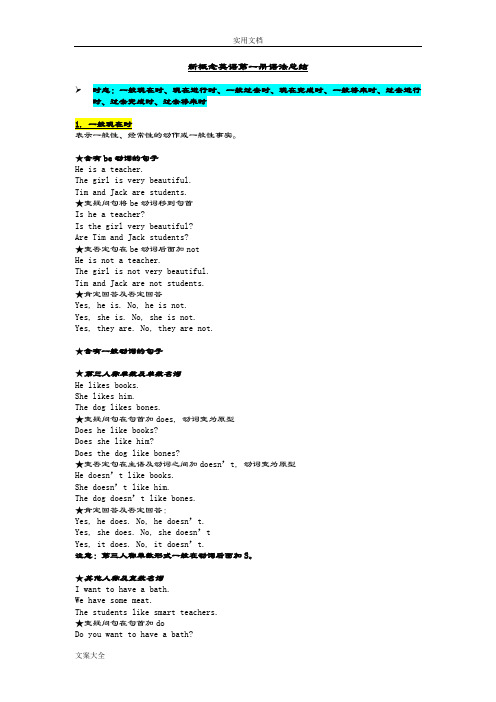
新概念英语第一册语法总结时态:一般现在时、现在进行时、一般过去时、现在完成时、一般将来时、过去进行时、过去完成时、过去将来时★含有be动词的句子He is a teacher.The girl is very beautiful.Tim and Jack are students.★变疑问句将be动词移到句首Is he a teacher?Is the girl very beautiful?Are Tim and Jack students?★变否定句在be动词后面加notHe is not a teacher.The girl is not very beautiful.Tim and Jack are not students.★肯定回答及否定回答Yes, he is. No, he is not.Yes, she is. No, she is not.Yes, they are. No, they are not.★含有一般动词的句子★第三人称单数及单数名词He likes books.She likes him.The dog likes bones.★变疑问句在句首加does, 动词变为原型Does he like books?Does she like him?Does the dog like bones?★变否定句在主语及动词之间加doesn’t, 动词变为原型He doesn’t like books.She doesn’t like him.The dog doesn’t like bones.★肯定回答及否定回答:Yes, he does. No, he doesn’t.Yes, she does. No, she doesn’tYes, it does. No, it doesn’t.注意:第三人称单数形式一般在动词后面加S。
★其他人称及复数名词I want to have a bath.We have some meat.The students like smart teachers.★变疑问句在句首加doDo you want to have a bath?Do we have any meat?Do the students like smart teachers?★变否定句在主语和动词之间加don’t.You don’t want to have a bath.We don’t have any meat.The students don’t like smart teachers.★肯定回答及否定回答Yes, I do. No, I don’t.Yes, we do. No, we don’tYes, they do. No, they don’t.构成:主语+be动词+动词的现在分词+其它成分We are having lunch.He is reading a book.The dog is running after a cat.The boys are swimming across the river.★变疑问句将be动词移到句首Are we having lunch?Is he reading a book?Is the dog running after a cat?Are the boys swimming across the river?★变否定句在be动词后面加notWe are not having lunch.He is not reading a book.The dog is not running after a cat.The boys are swimming across the river.★特殊疑问句:what, which, how, where, who, etc.疑问词+be动词+主语+现在分词What are you doing?What is she doing?What is the dog doing?没有进行时的动词(必背)表示状态、思想、感情、感觉的动词不能表示正在进行的动作1. 表示感觉、感官的词see, hear, like, love, want2. have, has作为动词”拥有”的含义时,没有进行时常和表示过去的时间状语连用,如yesterday, last night, the day before yesterday, three days ago.含有be动词的句子,将动词变为过去式,am / is的变为was,are的变为wereI was at the butcher’s.You were a student a year ago.The teacher was very beautiful ten years ago.★变疑问句将be动词移动到句首Were you at the butcher’s?Were you a student a year ago?Was the teacher very beautiful ten years ago?★变否定句在be动词后面加notI was not at the butcher’s.You were not a student a year ago.The teacher was not very beautiful ten years ago.★肯定回答否定回答Yes, I was. No, I was not.Yes, you were. No, you were not.Yes, he/she was. No, he/she was not.★特殊疑问句:What did you do?不含有be动词的句子,将动词变为过去式,动词过去式构成见附录I finished my homework yesterday.The boy went to a restaurant.The Sawyers lived at King Streeta year ago.King Streeta year ago.★变疑问句在句首加did,动词变为原型Did you finish your homework yesterday?Did the boy go to a restaurant?Did the Sawyers live at King Streeta year ago?King Streeta year ago?★变否定句在主语和动词之间加did not,动词变为原型I did not finish my homework yesterday.The boy did not go to a restaurant.The Sawyers did not live at King Streeta year ago.King Streeta year ago.★肯定回答及否定回答Yes, I did. No, I didn’t.Yes, he did. No, he didn’t.Yes, they did. No, they did not.have/has+过去分词用法:1)表示过去发生且和现在有某种联系的动作,常和just, usually, already, since等时间副词连用I have just had lunch. (饱了,不用再吃了)He has had a cup of tea.(不渴了,不用再喝)They have already had their holiday. (不能再度假了)The boy has already read the book. (已经知道书的内容了,不用再看了)2)询问别人是否做过某事一般用现在完成时Have you finished your homework?Have you been to Beijing?Have he seen the film?3)表示开始于过去并持续到现在的动作I have lived in Beijing for twenty years.I have worked for this school for 1 year.4)表示一种经历、经验:去过…地方,做过…事情,经历过…事情I have never had a bath.I have never seen a film.I have never been to cinema.I have ever been to Paris.Have been to表示去过,have gone to 表示去了I have been to London.(人已经回来)He has gone to London.(人还在那里)5)表示一种结果,一般不和时间副词联用I have lost my pen.I have hurt myself.He has become a teacher.She has broken my heart.句型变化:★变疑问句将助动词移到句首,变否定句在助动词后面加not.Have you lost your pen? I have not lost my pen.★肯定回答及否定回答Yes, I have. No, I have not.★特殊疑问句:What have you done?What has he done?一般过去时与现在完成时的区别:凡是有明确的表示过去的时间状语的句子为过去时注意:有些动词表示的动作有一个终点,不能再延续,因此不能和表示一段时间状语连用错:I’ve left Beijing for 3 days.对:I left Beijing 3 days ago. I have been away from being for 3 days.经常和tomorrow, next year, the day after tomorrow, the year after the next, in five hours’ time, etc. 表示将来的词联用结构:主语+助动词will+动词原形I will go to America tomorrow.The pilot will fly to Japan the month after the next.Jack will move into his new house tomorrow morning.★变疑问句将助动词移到句首Will you go to America tomorrow?Will the pilot fly to Japan the month after the next?Will Jack move into his new house tomorrow morning?★变否定句在助动词后面加notI will not go to America tomorrow.The pilot will not fly to Japan the month after the next.Jack will not move into his new house tomorrow morning★肯定回答及否定回答Yes, I will. No, I will not.Yes, he/she will. No, he/she will not.Yes, he will. No, he will not.★特殊疑问句:What will you do?结构:had+过去分词After she had finished her homework, she went shopping.They had sold the car before I asked the price.The train had left before I arrived at the station.After/before引导的时间状语从句放在句首要在句子后面加逗号,如果放在主句后则不用。
新概念英语第一册重点词汇和语法(完整版)
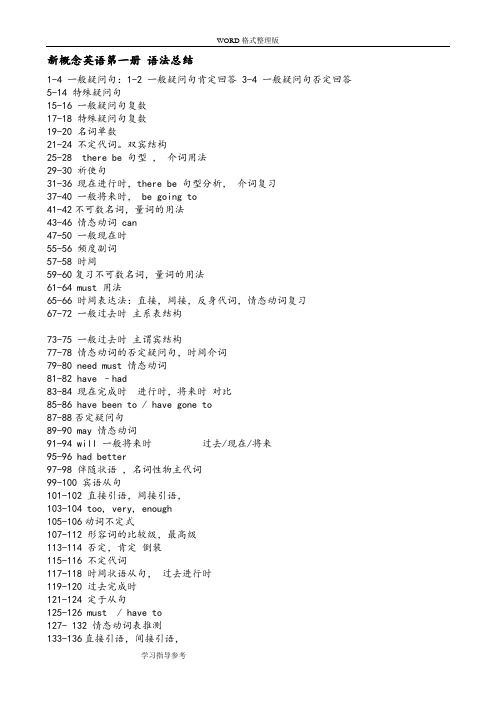
新概念英语第一册语法总结1-4 一般疑问句:1-2 一般疑问句肯定回答 3-4 一般疑问句否定回答5-14 特殊疑问句15-16 一般疑问句复数17-18 特殊疑问句复数19-20 名词单数21-24 不定代词。
双宾结构25-28 there be 句型,介词用法29-30 祈使句31-36 现在进行时,there be 句型分析,介词复习37-40 一般将来时, be going to41-42不可数名词,量词的用法43-46 情态动词 can47-50 一般现在时55-56 频度副词57-58 时间59-60复习不可数名词,量词的用法61-64 must 用法65-66 时间表达法:直接,间接,反身代词,情态动词复习67-72 一般过去时主系表结构73-75 一般过去时主谓宾结构77-78 情态动词的否定疑问句,时间介词79-80 need must 情态动词81-82 have –had83-84 现在完成时进行时,将来时对比85-86 have been to / have gone to87-88否定疑问句89-90 may 情态动词91-94 will 一般将来时过去/现在/将来95-96 had better97-98 伴随状语,名词性物主代词99-100 宾语从句101-102 直接引语,间接引语,103-104 too, very, enough105-106动词不定式107-112 形容词的比较级,最高级113-114 否定,肯定倒装115-116 不定代词117-118 时间状语从句,过去进行时119-120 过去完成时121-124 定于从句125-126 must / have to127- 132 情态动词表推测133-136直接引语,间接引语,137-138 条件状语从句139-140宾语从句141-144 被动语态Lesson 1 Excuse me1. Words1) excuse (1)重音(2)与sorry 的区别(3)Excuse 用的不同场景a. 请别人让路b. 引起别人的注意c. 打断别人的谈话d. 可以当n. 借口 eg. No excuse. 别找借口,没有借口。
最全的新概念英语第一册语法汇总
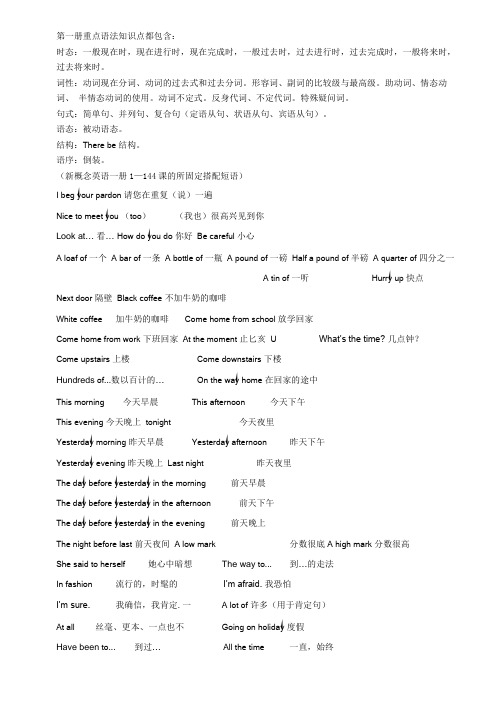
第一册重点语法知识点都包含:时态:一般现在时,现在进行时,现在完成时,一般过去时,过去进行时,过去完成时,一般将来时,过去将来时。
词性:动词现在分词、动词的过去式和过去分词。
形容词、副词的比较级与最高级。
助动词、情态动词、半情态动词的使用。
动词不定式。
反身代词、不定代词。
特殊疑问词。
句式:简单句、并列句、复合句(定语从句、状语从句、宾语从句)。
语态:被动语态。
结构:There be结构。
语序:倒装。
(新概念英语一册1—144课的所固定搭配短语)I beg your pardon 请您在重复(说)一遍Nice to meet you (too)(我也)很高兴见到你Look at… 看… How do you do 你好Be careful 小心A loaf of 一个 A bar of 一条 A bottle of 一瓶 A pound of 一磅Half a pound of 半磅 A quarter of 四分之一A tin of 一听Hurry up 快点Next door 隔壁Black coffee 不加牛奶的咖啡White coffee 加牛奶的咖啡Come home from school放学回家Come home from work 下班回家At the moment 止匕亥U What’s the time? 几点钟?Come upstairs 上楼Come downstairs 下楼Hundreds of...数以百计的…On the way home 在回家的途中This morning 今天早晨This afternoon 今天下午This evening 今天晚上tonight 今天夜里Yesterday morning 昨天早晨Yesterday afternoon 昨天下午Yesterday evening 昨天晚上Last night 昨天夜里The day before yesterday in the morning 前天早晨The day before yesterday in the afternoon 前天下午The day before yesterday in the evening 前天晚上The night before last 前天夜间 A low mark 分数很底A high mark 分数很高She said to herself 她心中暗想The way to... 到…的走法In fashion 流行的,时髦的I’m afraid. 我恐怕I’m sure.我确信,我肯定.一 A lot of 许多(用于肯定句)At all 丝毫、更本、一点也不Going on holiday 度假Have been to... 到过…All the time 一直,始终Have been to…到过…Drive into…撞倒.•・For sale 供出售、出售Have the last word 最后决定、最后才算The R.A.F. 英国皇家空军Return ticket 往返票Next door to... 与..•相邻,在..•隔壁In five hours’time在五小时之后。
新概念英语第一册所有语法点汇总)
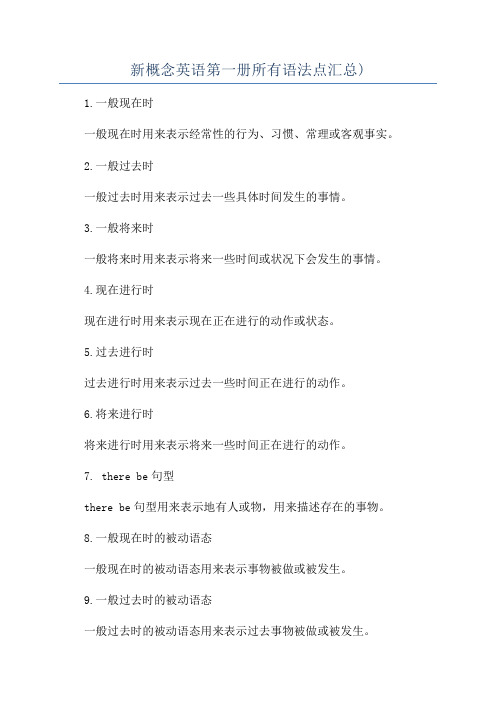
新概念英语第一册所有语法点汇总)1.一般现在时一般现在时用来表示经常性的行为、习惯、常理或客观事实。
2.一般过去时一般过去时用来表示过去一些具体时间发生的事情。
3.一般将来时一般将来时用来表示将来一些时间或状况下会发生的事情。
4.现在进行时现在进行时用来表示现在正在进行的动作或状态。
5.过去进行时过去进行时用来表示过去一些时间正在进行的动作。
6.将来进行时将来进行时用来表示将来一些时间正在进行的动作。
7. there be句型there be句型用来表示地有人或物,用来描述存在的事物。
8.一般现在时的被动语态一般现在时的被动语态用来表示事物被做或被发生。
9.一般过去时的被动语态一般过去时的被动语态用来表示过去事物被做或被发生。
10.一般将来时的被动语态一般将来时的被动语态用来表示将来事物将被做或被发生。
11.现在进行时的被动语态现在进行时的被动语态用来表示事物正在被做或被发生。
12.过去进行时的被动语态过去进行时的被动语态用来表示过去事物正在被做或被发生。
13. do与does的用法do和does用来构成否定句、疑问句和回答。
14.现在完成时现在完成时用来表示过去发生的动作对现在造成的影响或结果。
15.现在完成进行时现在完成进行时用来表示从过去开始一直延续到现在的动作,且这个动作可能还会继续下去。
16.过去完成时过去完成时用来表示过去在一些时间或事件之前已经完成的动作。
17.过去完成进行时过去完成进行时用来表示过去一些时间持续进行的动作,这个动作在另一个过去时间之前已经结束。
18.表示数量的词表示数量的词包括数词、基数词、序数词、分数和百分数等。
19.表示频率的词表示频率的词用来描述件事情发生的频率,如常常、经常、有时、很少、从不等。
20.表示时间的词表示时间的词用来描述一些事件发生的时间,如年、月、日、星期、时、分、秒等。
21.表示地点的词表示地点的词用来描述一些事件发生的地点,如国家、城市、街道、大楼等。
(完整版)新概念英语第一册所有语法点汇总)

新概念英语第一册所有语法点汇总Lesson 1 人称代词含有be动词的陈述句、否定句和一般疑问句Lesson 3 祈使句简单的倒装句Lesson 5 冠词Lesson 6 选择疑问句Lesson 7 特殊疑问句一般疑问句Lesson 9 How…?的一些社交上的用法形容词的意义与作用Lesson 11所有格形容词和所有格代词名词所有格Lesson 15 名词可数名词单数变复数的规则Lesson 16 名词复数-s或-es的发音规则Lesson 19 There be句型常见方位介词:in、on、over、under Lesson 21 动词的双宾语Lesson 23 定语Lesson 27 some, any一些Lesson 29 情态动词情态动词must的用法Lesson 31 时态:共十六种时态,时态是通过动词变化来实现的。
现在进行时Lesson 34 动词+ing的规则Lesson 35 短语动词Lesson 37 be going to句型宾语补足语Lesson 39 祈使句do的用法Lesson 40 词组:动词+介词Lesson 43 情态动词can的用法Lesson 47 一般现在时Lesson 48 序数词Lesson 49 动词加s(es) 规则动词不定式some、any用法Lesson 51 What…(be,look…) like? 频率副词Lesson 57 一般现在时与现在进行时Lesson 59 have/has的用法Lesson 61 主语+系动词+表语Lesson 63 each和every的区别Lesson 64 禁令Don’t and Mustn’tLesson 65 日期的表达反身代词Lesson 67 一般过去时动词的过去式变化否定疑问句Lesson 69 用介词at,on和in的时间短语Lesson 74 副词的用法副词的构成Lesson 75 宾语从句Lesson 79 Must与NeedLesson 83 现在完成时Lesson 85 现在完成时的特殊结构Lesson 89 for与sinceLesson 91 一般将来时Lesson 95 had better和mustLesson 99 宾语从句Lesson 100 直接引语和间接引语Lesson 101 反意疑问句Lesson 103 too与enough的用法Lesson 105 动词不定式Lesson 107 形容词的比较级和最高级Lesson 111 形容词的平级比较级Lesson 113 so与neither引导的简短回答Lesson 116 不定代词Lesson 117 过去进行时概念和结构Lesson 119 过去完成时Lesson 121 定语从句Lesson 123 感叹句Lesson 125 must, have to和needn’tLesson 127 表示猜测和推断的情态助动词must和can’tLesson 131 情态助动词may表示可能性Lesson 133 需改变时态的间接陈述句Lesson 135 Let的用法Lesson 137 条件从句Lesson 141 被动语态新概念英语第一册语法点归纳大纲新概念英语第一册语法点归纳新概念一共144课,其中单课为课文,双课为语法和练习。
最全的新概念英语第一册语法汇总
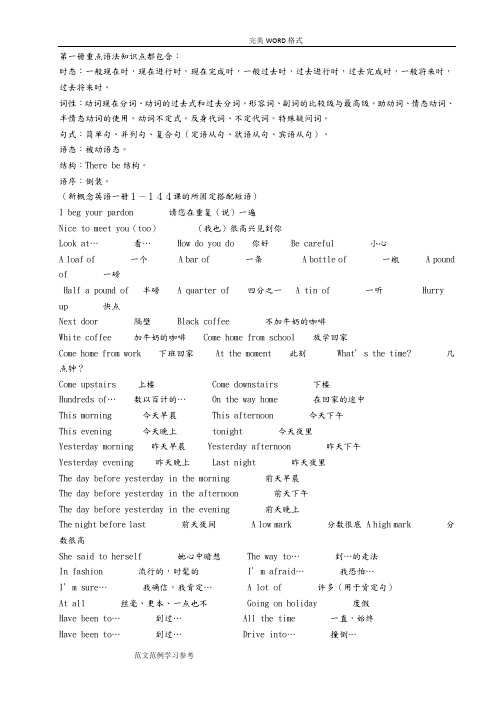
第一册重点语法知识点都包含:时态:一般现在时,现在进行时,现在完成时,一般过去时,过去进行时,过去完成时,一般将来时,过去将来时。
词性:动词现在分词、动词的过去式和过去分词。
形容词、副词的比较级与最高级。
助动词、情态动词、半情态动词的使用。
动词不定式。
反身代词、不定代词。
特殊疑问词。
句式:简单句、并列句、复合句(定语从句、状语从句、宾语从句)。
语态:被动语态。
结构:There be结构。
语序:倒装。
(新概念英语一册1-144课的所固定搭配短语)I beg your pardon 请您在重复(说)一遍Nice to meet you(too)(我也)很高兴见到你Look at…看… How do you do 你好 Be careful 小心A loaf of 一个 A bar of 一条 A bottle of 一瓶 A pound of 一磅Half a pound of 半磅 A quarter of 四分之一 A tin of 一听 Hurry up 快点Next door 隔壁 Black coffee 不加牛奶的咖啡White coffee 加牛奶的咖啡 Come home from school 放学回家Come home from work 下班回家 At the moment 此刻What’s the time?几点钟?Come upstairs 上楼 Come downstairs 下楼Hundreds of…数以百计的… On the way home 在回家的途中This morning 今天早晨 This afternoon 今天下午This evening 今天晚上 tonight 今天夜里Yesterday morning 昨天早晨 Yesterday afternoon 昨天下午Yesterday evening 昨天晚上 Last night 昨天夜里The day before yesterday in the morning 前天早晨The day before yesterday in the afternoon 前天下午The day before yesterday in the evening 前天晚上The night before last 前天夜间 A low mark 分数很底 A high mark 分数很高She said to herself 她心中暗想The way to…到…的走法In fashion 流行的,时髦的I’m afraid…我恐怕…I’m sure…我确信,我肯定… A lot of 许多(用于肯定句)At all 丝毫、更本、一点也不 Going on holiday 度假Have been to…到过… All the time 一直,始终Have been to…到过… Drive into…撞倒…For sale 供出售、出售 Have the last word 最后决定、最后才算The R.A.F. 英国皇家空军 Return ticket 往返票Next door to…与…相邻,在…隔壁In five hours’time在五小时之后。
新概念第一册语法知识点汇总(完美版)
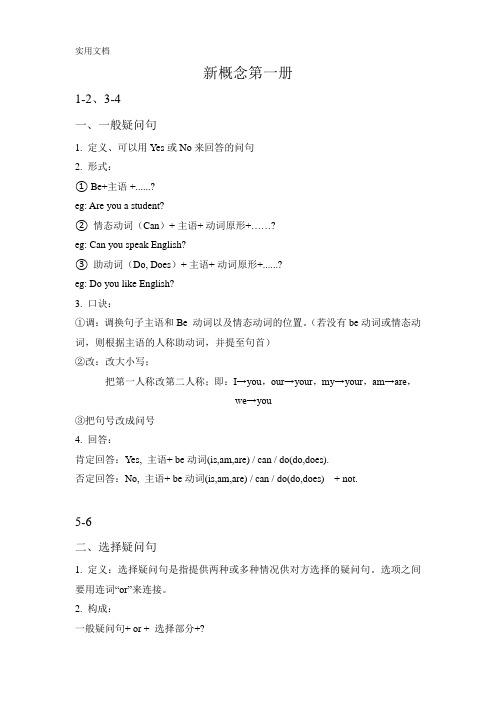
新概念第一册1-2、3-4一、一般疑问句1. 定义、可以用Yes或No来回答的问句2. 形式:① Be+主语 +......?eg: Are you a student?②情态动词(Can)+ 主语+ 动词原形+……?eg: Can you speak English?③助动词(Do, Does)+ 主语+ 动词原形+......?eg: Do you like English?3. 口诀:①调:调换句子主语和Be 动词以及情态动词的位置。
(若没有be动词或情态动词,则根据主语的人称助动词,并提至句首)②改:改大小写;把第一人称改第二人称;即:I→you,our→your,my→your,am→are,we→you③把句号改成问号4. 回答:肯定回答:Yes, 主语+ be动词(is,am,are) / can / do(do,does).否定回答:No, 主语+ be动词(is,am,are) / can / do(do,does) + not.5-6二、选择疑问句1. 定义:选择疑问句是指提供两种或多种情况供对方选择的疑问句。
选项之间要用连词“or”来连接。
2. 构成:一般疑问句+ or + 选择部分+?例:Are you a doctor or a teacher? 你是一个医生还是教师?Does he like this or that? 他喜欢这个还是喜欢那个?Is that coffee yours or hers? 这咖啡是你的还是她的?注:有时候选择部分会用“or not”来表示例:Are you ready or not (ready) ? 你准备好没有?Do you like the film or not? 你喜不喜欢这部电影?7-8、11-12、13-14三、特殊疑问句1. 含义:以特殊疑问词开头的疑问句。
2. 构成:特殊疑问词+一般疑问句+?3. 特殊疑问词总结:(1) what 什么(职业,姓名等)what day 星期几What day is it today? 几天星期几?what size 多大尺码What size are your shoes? 你的鞋码多大?what time 什么时间What time is it now? 现在几点了?what colour 什么颜色What color is your schoolbag? 你的书包是什么颜色?(2) when 什么时候(就时间提问)When will you visit Beijing? 你什么时候去北京玩?(3) where 什么地方(就地点提问)Where is your hometown? 你的家乡在哪?(4) who 谁(问人的身份,姓名等)Who is the girl in red dress? 穿着红裙子的女生是谁?(5) whose 谁的(whose + n.)Whose book is this?这是谁的书?(6) which 哪一个;哪些Which one is your sister ? 哪一个是你姐姐?(7) why 为什么(就原因提问,常用because回答)Why did you break the window?你为什么要打破窗户?(8) how 怎么样How do you go to school? 你怎么去学校?how many多少(提问可数名词数量)How many books do you have ?你有几本书?how much 多少(提问不可数名词数量)How much water is there in the glass?玻璃杯里有多少水?how much 多少钱(提问价格)How much is the ruler? 这把尺子多少钱?how old 几岁(提问年龄)How old are you? 你多少岁了?how long 多长(提问长度)How long is this ruler? 这把尺子有多长?多长时间(时间持续多久)How long do you go to school? 你去学校要多长时间?how often 多久一次(提问频率既单位时间发生多少次)how soon (还要多久时间才能开始或结束)How soon will he come back? 他多久才能回来?how heavy(提问有多重)How heavy is the luggage?这个行李箱有多重?9-10四、祈使句1. 定义:用于表达命令、请求、劝告、警告等的句子叫做祈使句。
(完整版)最全新概念英语第一册语法汇总,文档

时态:大凡现在时,现在进行时,现在完成时,大凡过去时,过去进行时,过去完成时,大凡将来时,过去将来时。
性:在分、的去式和去分。
形容、副的比与最高。
助、情、半情的使用。
不定式。
反身代、不定代。
分外疑。
句式:句、并列句、复合句〔定从句、状从句、从句〕。
:被。
构: There be构。
序:倒装。
〔新看法英一册1-144的所不搭配短〕I beg your pardon 您在重复〔〕一遍Nice to meet you〔too〕〔我也〕很高到你Look at 看⋯⋯ How do you do你好 Be careful小心A loaf of 一个 A bar of 一条 A bottle of 一瓶 A pound of 一磅 Half a pound of 半磅 A quarter of 四分之一 A tin of 一听 Hurry up 快点 Next door 近邻 Black coffee 不加牛奶的咖啡White coffee 加牛奶的咖啡 Come home from school 放学回家Come home from work 下班回家 At the moment 现在 What’ s the time?几点? Come upstairs上楼 Come downstairs下楼Hundreds of 数⋯以百的⋯ On the way home在回家的途中This morning 今天清早 This afternoon 今天下午This evening今天夜晚 tonight 今天夜里Yesterday morning 昨天清早 Yesterday afternoon 昨天下午Yesterday evening昨天夜晚 Last night 昨天夜里The day before yesterday in the morning前天清早The day before yesterday in the afternoon 前天下午The day before yesterday in the evening前天夜晚The night before last 前天夜 A low mark 分数很底 A high mark 分数很高She said to herself她心中暗想 The way to 到⋯⋯的走法In fashion 流行的,髦的I ’ m afraid我恐⋯怕⋯I ’ m sure我⋯确信,我必然⋯ A lot of多〔用于必然句〕At all 毫、更本、一点也不Going on holiday 度假Have been to 到⋯⋯ All the time素来,始Have been to 到⋯⋯ Drive into 撞倒⋯⋯For sale 供销售、销售 Have the last word 最后决定、最后才算英.国皇家空Return ticket 往返票Next door to与⋯相,在⋯近邻In five hours’在time五小此后。
新概念英语第一册语法知识点

新概念英语第一册语法总结时态:一般现在时、现在进行时、一般过去时、现在完成时、一般将来时、过去进行时、过去完成时、过去将来时1. 一般现在时★含有be动词的句子He is a teacher.The girl is very beautiful.Tim and Jack are students.★变疑问句将be动词移到句首Is he a teacherIs the girl very beautifulAre Tim and Jack students★变否定句在be动词后面加notHe is not a teacher.The girl is not very beautiful.Tim and Jack are not students.★肯定回答及否定回答Yes, he is. No, he is not.Yes, she is. No, she is not.Yes, they are. No, they are not.★含有一般动词的句子★第三人称单数及单数名词He likes books.She likes him.The dog likes bones.★变疑问句在句首加does, 动词变为原型Does he like booksDoes she like himDoes the dog like bones★变否定句在主语及动词之间加doesn’t, 动词变为原型He doesn’t like books.She doesn’t like him.The dog doesn’t like bones.★肯定回答及否定回答:Yes, he does. No, he doe sn’t.Yes, she does. No, she doesn’tYes, it does. No, it doesn’t.注意:第三人称单数形式一般在动词后面加S。
★其他人称及复数名词I want to have a bath.We have some meat.The students like smart teachers.★变疑问句在句首加doDo you want to have a bathDo we have any meatDo the students like smart teachers★变否定句在主语和动词之间加don’t.You don’t want to have a bath.We don’t have any meat.The students don’t like smart teachers.★肯定回答及否定回答Yes, I do. No, I don’t.Yes, we do. No, we don’tYes, they do. No, they don’t.构成:主语+be动词+动词的现在分词+其它成分We are having lunch.He is reading a book.The dog is running after a cat.The boys are swimming across the river.★变疑问句将be动词移到句首Are we having lunchIs he reading a bookIs the dog running after a catAre the boys swimming across the river★变否定句在be动词后面加notWe are not having lunch.He is not reading a book.The dog is not running after a cat.The boys are swimming across the river.★特殊疑问句:what, which, how, where, who, etc.疑问词+be动词+主语+现在分词What are you doingWhat is she doingWhat is the dog doing没有进行时的动词(必背)表示状态、思想、感情、感觉的动词不能表示正在进行的动作1. 表示感觉、感官的词see, hear, like, love, want2. have, has作为动词”拥有”的含义时,没有进行时常和表示过去的时间状语连用,如yesterday, last night, the day before yesterday, three days ago.含有be动词的句子,将动词变为过去式,am / is的变为was,are的变为wereI was at the butcher’s.You were a student a year ago.The teacher was very beautiful ten years ago.★变疑问句将be动词移动到句首Were you at the butcher’sWere you a student a year agoWas the teacher very beautiful ten years ago★变否定句在be动词后面加notI was not at the butcher’s.You were not a student a year ago.The teacher was not very beautiful ten years ago.★肯定回答否定回答Yes, I was. No, I was not.Yes, you were. No, you were not.Yes, he/she was. No, he/she was not.★特殊疑问句:What did you do不含有be动词的句子,将动词变为过去式,动词过去式构成见附录I finished my homework yesterday.The boy went to a restaurant.The Sawyers lived at King Streeta year ago.King Streeta year ago.★变疑问句在句首加did,动词变为原型Did you finish your homework yesterdayDid the boy go to a restaurantDid the Sawyers live at King Streeta year agoKing Streeta year ago★变否定句在主语和动词之间加did not,动词变为原型I did not finish my homework yesterday.The boy did not go to a restaurant.The Sawyers did not live at King Streeta year ago.King Streeta year ago.★肯定回答及否定回答Yes, I did. No, I didn’t.Yes, he did. No, he didn’t.Yes, they did. No, they did not.have/has+过去分词用法:1)表示过去发生且和现在有某种联系的动作,常和just, usually, already, since等时间副词连用I have just had lunch. (饱了,不用再吃了)He has had a cup of tea.(不渴了,不用再喝)They have already had their holiday. (不能再度假了)The boy has already read the book. (已经知道书的内容了,不用再看了)2)询问别人是否做过某事一般用现在完成时Have you finished your homeworkHave you been to BeijingHave he seen the film3)表示开始于过去并持续到现在的动作I have lived in Beijing for twenty years.I have worked for this school for 1 year.4)表示一种经历、经验:去过…地方,做过…事情,经历过…事情I have never had a bath.I have never seen a film.I have never been to cinema.I have ever been to Paris.Have been to表示去过,have gone to 表示去了I have been to London.(人已经回来)He has gone to London.(人还在那里)5)表示一种结果,一般不和时间副词联用I have lost my pen.I have hurt myself.He has become a teacher.She has broken my heart.句型变化:★变疑问句将助动词移到句首,变否定句在助动词后面加not.Have you lost your pen I have not lost my pen.★肯定回答及否定回答Yes, I have. No, I have not.★特殊疑问句:What have you doneWhat has he done一般过去时与现在完成时的区别:凡是有明确的表示过去的时间状语的句子为过去时注意:有些动词表示的动作有一个终点,不能再延续,因此不能和表示一段时间状语连用错:I’ve left Beijing for 3 days.对:I left Beijing 3 days ago. I have been away from being for 3 days.经常和tomorrow, next year, the day after tomorrow, the year after the next, in five hours’ time, etc. 表示将来的词联用结构:主语+助动词will+动词原形I will go to America tomorrow.The pilot will fly to Japan the month after the next.Jack will move into his new house tomorrow morning.★变疑问句将助动词移到句首Will you go to America tomorrowWill the pilot fly to Japan the month after the nextWill Jack move into his new house tomorrow morning★变否定句在助动词后面加notI will not go to America tomorrow.The pilot will not fly to Japan the month after the next.Jack will not move into his new house tomorrow morning★肯定回答及否定回答Yes, I will. No, I will not.Yes, he/she will. No, he/she will not.Yes, he will. No, he will not.★特殊疑问句:What will you do结构:had+过去分词After she had finished her homework, she went shopping.They had sold the car before I asked the price.The train had left before I arrived at the station.After/before引导的时间状语从句放在句首要在句子后面加逗号,如果放在主句后则不用。
- 1、下载文档前请自行甄别文档内容的完整性,平台不提供额外的编辑、内容补充、找答案等附加服务。
- 2、"仅部分预览"的文档,不可在线预览部分如存在完整性等问题,可反馈申请退款(可完整预览的文档不适用该条件!)。
- 3、如文档侵犯您的权益,请联系客服反馈,我们会尽快为您处理(人工客服工作时间:9:00-18:30)。
---------------------考试---------------------------学资学习网---------------------押题------------------------------
新概念英语第一册所有语法点汇总
Lesson 1 人称代词含有be动词的陈述句、否定句和一般疑问句Lesson 3 祈使句简单的倒装句
Lesson 5 冠词
Lesson 6 选择疑问句
Lesson 7 特殊疑问句一般疑问句
Lesson 9 How …?的一些社交上的用法形容词的意义与作用Lesson 11所有格形容词和所有格代词名词所有格
Lesson 15 名词可数名词单数变复数的规则
Lesson 16 名词复数-s或-es的发音规则
Lesson 19 There be 句型常见方位介词:in、on、over、under Lesson 21 动词的双宾语
Lesson 23 定语
Lesson 27 some, any 一些
Lesson 29 情态动词情态动词must的用法
Lesson 31 时态:共十六种时态,时态是通过动词变化来实现的。
现在进行时
Lesson 34 动词+ing的规则
Lesson 35 短语动词
Lesson 37 be going to 句型宾语补足语
Lesson 39 祈使句do的用法
1 / 8
Lesson 40 词组:动词+介词
Lesson 43 情态动词can的用法
Lesson 47 一般现在时
Lesson 48 序数词
Lesson 49 动词加s(es) 规则动词不定式some、any用法Lesson 51 What…(be,look…) like? 频率副词
Lesson 57 一般现在时与现在进行时
Lesson 59 have/has的用法
Lesson 61 主语+系动词+表语
Lesson 63 each和every的区别
Lesson 64 禁令Don't and Mustn't
Lesson 65 日期的表达反身代词
Lesson 67 一般过去时动词的过去式变化否定疑问句Lesson 69 用介词at,on和in的时间短语
Lesson 74 副词的用法副词的构成
Lesson 75 宾语从句
Lesson 79 Must与Need
Lesson 83 现在完成时
Lesson 85 现在完成时的特殊结构
Lesson 89 for与since
Lesson 91 一般将来时
2 / 8
Lesson 95 had better和must
Lesson 99 宾语从句
Lesson 100 直接引语和间接引语
Lesson 101 反意疑问句
Lesson 103 too与enough的用法
Lesson 105 动词不定式
Lesson 107 形容词的比较级和最高级
Lesson 111 形容词的平级比较级
Lesson 113 so与neither引导的简短回答
Lesson 116 不定代词
Lesson 117 过去进行时概念和结构
Lesson 119 过去完成时
Lesson 121 定语从句
Lesson 123 感叹句
Lesson 125 must, have to和needn't
Lesson 127 表示猜测和推断的情态助动词must和can't Lesson 131 情态助动词may表示可能性
Lesson 133 需改变时态的间接陈述句
Lesson 135 Let的用法
Lesson 137 条件从句
Lesson 141 被动语态
3 / 8
新概念英语第一册语法点归纳大纲
新概念英语第一册语法点归纳
新概念一共144课,其中单课为课文,双课为语法和练习。
整本书是以单数课为正课,并附带有插图而双数课则是针对单数课所讲的内容有针对性地进行练习,从此出展现出整个新概念一教材区别于其他教材的独特之处。
以下是我对新概念一整本教材的理解和剖析,以供各位老师在讲课和对整个课本的理解和把握上参考和借鉴。
首先根据课本中出现的时态来分析:
本册书的语法出现层次性和规律性是很强的,首先我们先来整本书中都出了哪些时态,这些时态的具体分布和讲解时我们大家需要注意的递进性。
Lesson 31—34 现在进行时
Lesson 37--40 第一次出现be going to 的将来时
Lesson51—56 一般现在时
Lesson 67—76 为一般过去式
Lesson 83—90 为现在完成时
Lesson 91—96 为一般将来时( will)
Lesson 117—118 过去进行时
Lesson119—120 过去完成时
除去前面所有时态和句型所占据的76课我们一起来看一下以下的68课,每一课小的语言点,语法点都是在什么地方,应该用什么样的方式来讲解。
在这里告诉学员新概念一每一个单课的重点都是出现双课的标题和课后的练习题里面。
Lesson1-2
4 / 8
语言点:与陌生人说话或引起别人的注意。
Excuse me. Yes? Pardon? Thank
you very much.
语法点:主系表结构this为主语,名词做表语1的一般疑问句以及它的肯定回答。
Is this your handbag? Yes, it is.
lesson 5-6
语言点:如何介绍别人。
This is Miss Sophie Dupont. Nice to meet you. 语法点:主语为第三人称单数的主系表结构。
She is French. He is German.
It's a Volvo.(L6)
a/an 的使用。
Lesson 7-8
语言点:如何自我介绍和相互认识。
语法点:主语为第二人称的主系表结构。
Are you French?
What nationality are you? What's your job? 特殊疑问句
Lesson 9-10
语言点:朋友或熟识的人之间如何相互问候。
How are you?
语法点:主系表结构形容词做表语。
介词短语表示位置near the window on the televion on the wall L29-30
语言点: 如何发号命令
语法点: 祈使句(肯定)
动词与宾语的固定搭配.
L37-38
5 / 8
语言点:如何表达将要做的事情.
语法点:现在进行时态be going to do结构表达将要发生的事情There be 句型的一般疑问句形式.
L41-42
语言点:
语法点:如何表示不可数名词的量.
L63-64
语言点:建议忠告
语法点:don't do…. You mustn't do…
L65-66
语法点:具体时间表示法(半点和刻钟)
反身代词
具体日期表达方式
L73-74
语言点:问路
语法点:不规则动词的过去式.
形容词转变成副词.
L77-78
语言点:看病
语法点:综合时间表达方式
L105-106
6 / 8
语言点:办公室用语
语法点:want sb to do…./ tell sb to do…以及其否定形式. L103-104
语言点:考试
语法点:宾语从句.(从句部分为非现在时态)
程度副词too very enough
L125-126
语言点:
语法点:have to do…/ don't need to do…
L127-128
语言点:娱乐界
语法点:must/can't 对现在事情的肯定/否定猜测.
L129-130
语言点:交通状况.
语法点:must/can't have been….对过去事情的肯定/否定猜测. L131-132
语言点:度假.
语法点:may 对现在/过去事情的肯定或否定猜测.
以下学的知识慢慢与新二接轨:
Lesson 83—90 为现在完成时
直接引语变成间接引语—99-102
7 / 8
形容词的比较级和最高级—107-112
neither ,so 的用法—113-114
不定代词的用法—115-116
过去进行和过去完成时---117-120
定语从句-----121-124
情态动词的综合用法—125-132
直接引语变间接引语—133-136着重讲时态的倒推if 的用法---137-140
被动语态---141-144
新概念英语哪几个推荐背诵?
推荐第三册:
18 Electric currents in modern art
22 By heart
25 The Cutty
day to remember
happy discovery
35 Justice was done
40 Who's who
新概念英语2册
2 1
3 16 25 35 48 57 68 79 本人的个人意见
8 / 8。

